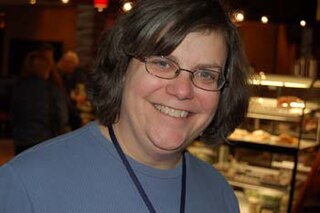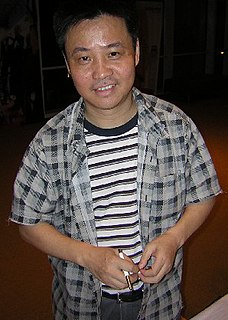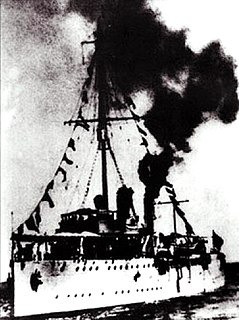The Otherwise Award, formerly known as the James Tiptree Jr. Award, is an annual literary prize for works of science fiction or fantasy that expand or explore one's understanding of gender. It was initiated in February 1991 by science fiction authors Pat Murphy and Karen Joy Fowler, subsequent to a discussion at WisCon.

Science fiction is a genre of speculative fiction which typically deals with imaginative and futuristic concepts such as advanced science and technology, space exploration, time travel, parallel universes, extraterrestrial life, sentient artificial intelligence, cybernetics, certain forms of immortality, and the singularity. It has been called the "literature of ideas", and it often explores the potential consequences of scientific, social, and technological innovations.

Raphael Aloysius Lafferty was an American science fiction and fantasy writer known for his original use of language, metaphor, and narrative structure, as well as for his etymological wit. He also wrote a set of four autobiographical novels, In a Green Tree; a history book, The Fall of Rome; and several novels of historical fiction.

Crime fiction, detective story, murder mystery, mystery novel, and police novel are terms used to describe narratives that centre on criminal acts and especially on the investigation, either by an amateur or a professional detective, of a crime, often a murder. It is usually distinguished from mainstream fiction and other genres such as historical fiction or science fiction, but the boundaries are indistinct. Crime fiction has multiple subgenres, including detective fiction, courtroom drama, hard-boiled fiction, and legal thrillers. Most crime drama focuses on crime investigation and does not feature the courtroom. Suspense and mystery are key elements that are nearly ubiquitous to the genre.

Kim James Newman is an English journalist, film critic and fiction writer. Recurring interests visible in his work include film history and horror fiction—both of which he attributes to seeing Tod Browning's Dracula at the age of eleven—and alternative fictional versions of history. He has won the Bram Stoker Award, the International Horror Guild Award, and the BSFA award.

Maureen F. McHugh is an American science fiction and fantasy writer.

Terry Ballantine Bisson is an American science fiction and fantasy author. He is best known for his short stories, including "Bears Discover Fire", which won the Hugo Award and the Nebula Award, and "They're Made Out of Meat".

Yu Hua is a Chinese author. Shortly after his debut as a fiction writer in 1983, his first breakthrough came in 1987, when he released the short story On the Road at Age Eighteen. Yu Hua was regarded as a promising avant-garde or post-New Wave writer. Many critics also regard him as a champion for Chinese meta-fictional or postmodernist writing. His novels To Live (1993) and Chronicle of a Blood Merchant (1995) were widely acclaimed. When he experimented with more chaotic themes like in Brothers (2005–06), Yu Hua received criticism from critics and readers.

To Live, also titled Lifetimes in some English versions, is a 1994 Chinese drama film directed by Zhang Yimou and written by Lu Wei, based on the novel of the same name by Yu Hua. It is produced by the Shanghai Film Studio and ERA International, starring Ge You and Gong Li, in her 7th collaboration with director Zhang Yimou.
"Skinner's Room" is a science fiction short story by American-Canadian author William Gibson, originally composed for Visionary San Francisco, a 1990 museum exhibition exploring the future of San Francisco. It features the first appearance in Gibson's fiction of "the Bridge", which Gibson revisited as the setting of his acclaimed Bridge trilogy of novels. In the story, the Bridge is overrun by squatters, among them Skinner, who occupies a shack atop a bridgetower. An altered version of the story was published in Omni magazine and subsequently anthologized. "Skinner's Room" was nominated for the 1992 Locus Award for Best Short Story.

The Telling is a 2000 science fiction novel by Ursula K. Le Guin set in her fictional universe of Hainish Cycle. The Telling is Le Guin's first follow-up novel set in the Hainish Cycle since her 1974 novel The Dispossessed. It tells the story of Sutty, a Terran sent to be an Ekumen observer, on the planet Aka, and her experiences of political and religious conflicts between a corporatist government and the indigenous resistance, which is centered on the traditions of storytelling, locally referred to as "the Telling".

Mundane science fiction (MSF) is a niche literary movement within science fiction that developed in the early 2000s, with principles codified by the "Mundane Manifesto" in 2004, signed by author Geoff Ryman and "The Clarion West 2004 Class". The movement proposes "mundane science fiction" as its own subgenre of science fiction, typically characterized by its setting on Earth or within the Solar System; a lack of interstellar travel, intergalactic travel or human contact with extraterrestrials; and a believable use of technology and science as it exists at the time the story is written or a plausible extension of existing technology. There is debate over the boundaries of MSF and over which works can be considered canonical. Rudy Rucker has noted MSF's similarities to hard science fiction and Ritch Calvin has pointed out MSF's similarities to cyberpunk. Some commentators have identified science fiction films and television series which embody the MSF ethos of near-future realism.
Zhang Jie was a Chinese novelist and short-story writer. In the meanwhile, she was also the co-author of a biography of the film director Wu Zuguang in 1986. She worked on writing different kinds of books for or with young protagonists, these types of works are included in junior and senior high school textbooks in China. She is one of China's first contributors to feminist fiction. In Zhang Jie's works, she mainly worked on the themes of "people" and "love", she often emphasizes the emotions and relationships between mother and daughter, which was formed mainly by early poverty and the fierce protection of her mother. The Person Who loved me the most on earth is gone is the long story, which is a long self-statement recounting the last eighty days and nights of her mother's life, who died in 1991. She remembered her mother's submission, dependence and forbearance to her, and her consideration, complaint and regret to her mother. This novel is a simple and unpretentious expression of the love between mother and daughter.

The Canton Coup of 20 March 1926, also known as the Zhongshan Incident or the March 20th Incident, was a purge of Communist elements of the Nationalist army in Guangzhou undertaken by Chiang Kai-shek. The incident solidified Chiang's power immediately before the successful Northern Expedition, turning him into the paramount leader of the country.

Yan Lianke is a Chinese writer of novels and short stories based in Beijing. His work is highly satirical, which has resulted in some of his most renowned works being banned in China. He has admitted to self-censorship while writing his stories in order to avoid censorship.

Yellow Earth is a 1984 Chinese drama film. This film is telling a story of a young, village girl who bravely resists old-dated customs and searches for freedom. It was the directorial debut for Chen Kaige. The film's notable cinematography is by Zhang Yimou. At the 24th Hong Kong Film Awards ceremony on 27 March 2005, a list of 100 Best Chinese Motion Pictures was tallied, and Yellow Earth came in fourth. The film was produced by Guangxi Film Studio.
Chinese science fiction is genre of literature that concerns itself with hypothetical future social and technological developments in the Sinosphere.

Soft science fiction, or soft SF, is a category of science fiction with two different definitions, defined in contrast to hard science fiction. It can refer to science fiction that explores the "soft" sciences, as opposed to hard science fiction, which explores the "hard" sciences. It can also refer to science fiction which prioritizes human emotions over the scientific accuracy or plausibility of hard science fiction.

The following outline is provided as an overview of and topical guide to science fiction:

The Year's Best Science Fiction: Tenth Annual Collection is an anthology of science fiction short stories edited by Gardner Dozois, the tenth volume in an ongoing series. It was first published in hardcover by St. Martin's Press in June 1993, with a trade paperback edition following in July 1993 and a book club edition co-issued with the Science Fiction Book Club in September 1993. The first British edition were published in hardcover by Robinson in September of the same year, under the alternate title Best New SF 7.
















